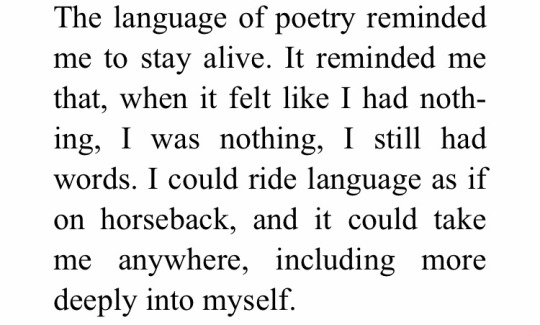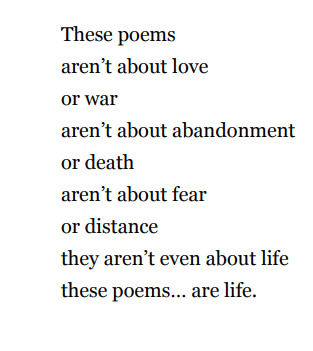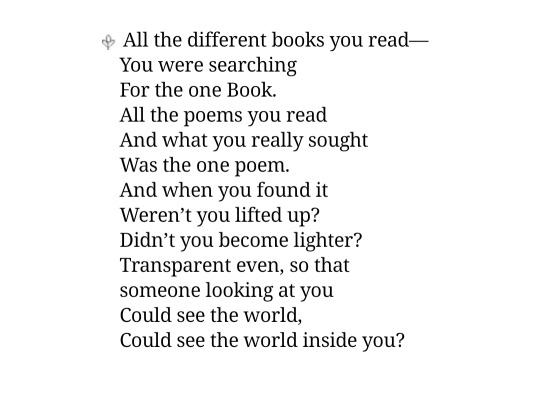#on poetry
Text
Lit Hub has posted an article with the names, photos and biographies of the Palestinian poets and writers killed by the IOF since the beginning of October. May we remember them, their names & their poems 🍉🕊🍓🪁
"Since October 7, Israel has killed at least thirteen Palestinian poets and writers in Gaza.
If we think of ourselves as a global literary community, then these people were our fellow travelers, our peers.
They—just like the more than 66 Palestinian journalists killed in Gaza in the line of duty; just like every one of the more than 21,000 innocent people massacred in Gaza, the West Bank, and Israel over the past 75 days—deserve to be remembered."
8K notes
·
View notes
Text

Victoria Chang, from Dear Memory: Letters on Writing, Silence, and Grief; “Dear Teacher,”
[Text ID: “The language of poetry reminded me to stay alive. It reminded me that, when it felt like I had nothing, I was nothing, I still had words. I could ride language as if on a horseback, and it could take me anywhere, including deeply into myself.”]
#victoria chang#on poetry#on language#excerpts#writings#literature#letters#prose#fragments#selections#words#quotes#typography#prose collection#letters collection
6K notes
·
View notes
Text
isnt it amazing we live in a world where theres poetry. why is nobody else going insane about it
#like!!!? we learn words & then we learn to turn them into beautiful things because its the only way we have to even begin to express whats +#inside all of us.#theres been poetry for as long as theres been written word & you expect me to be normal about it????????#dante.txt#on poetry
4K notes
·
View notes
Text

Frank O'Hara
#frank o'hara#meditations in an emergency#poetry#poem#typo edit#typography#on poetry#lunch poems#web weaving#anne sexton#sylvia plath#virginia woolf#ocean vuong#mangoszn
958 notes
·
View notes
Text
on storytelling and repetition
“...the secret of the Great Stories is that they have no secrets. The Great Stories are the ones you have heard and want to hear again. The ones you can enter anywhere and inhabit comfortably. They don’t deceive you with thrills and trick endings. They don’t surprise you with the unforeseen. They are as familiar as the house you live in. Or the smell of your lover’s skin. You know how they end, yet you listen as though you don’t. In the way that although you know that one day you will die, you live as though you won’t. In the Great Stories you know who lives, who dies, who finds love, who doesn’t. And yet you want to know again.”
— Arundhati Roy on Indian mythology and folklore, in God of Small Things (1997)
“It was only once – once – that an audience went to see Romeo and Juliet, and hoped they might live happily ever after. You can bet that the word soon went around the playhouses: they don’t get out of that tomb alive. But every time it’s been played, every night, every show, we stand with Romeo at the Capulets’ monument. We know: when he breaks into the tomb, he will see Juliet asleep, and believe she is dead. We know he will be dead himself before he knows better. But every time, we are on the edge of our seats, holding out our knowledge like a present we can’t give him.”
— Hilary Mantel on Shakespeare’s Romeo and Juliet, in “Can These Bones Live?”, Reith Lecture, 2017
“So what makes this poem mnemonic is not just repetition. Rather, it’s the fact that with repetition, the repeated phrase grows more and more questionable. I’ve remembered “Come on now, boys” because, with every new repetition, it seems to offer more exasperation than encouragement, more doubt than assertion. I remembered this refrain because it kept me wondering about what it meant, which is to say, it kept me wondering about the kind of future it predicted. What is mnemonic about this repetition is not the reader’s ability to remember it, but that the phrase itself remembers something about the people it addresses; it remembers violence. Repetition, then, is not only a demonstration of something that keeps recurring: an endless supply of new generations of cruel boys with sweaty fists. It is also about our inability to stop this repetition: the established cycles of repetition are like spells and there’s no anti-spell to stop them from happening. The more we repeat, the less power we have over the words and the more power the words have over us. Poetic repetition is about the potency of language and the impotence of its speakers. In our care, language is futile and change is impossible.”
— Valzhyna Mort on Russian poet Yevgeny Yevtushenko, in “FACE – FACE – FACE: A Poet Under the Spell of Loss”, The Poetry Society Annual Lecture, 2021
#web weaving#quote compilation#shakespeare#romeo and juliet#Hilary Mantel#arundhati roy#valzhyna mort#excerpt#on poetry#on storytelling#god of small things
2K notes
·
View notes
Text

Mary Ruefle, on poem endings, from Madness, Rack, and Honey: Collected Lectures
2K notes
·
View notes
Text
Poetry is the most ingrown and intense of the creative arts.
Sylvia Plath, The Unabridged Journals of Sylvia Plath — 27th December 1958
565 notes
·
View notes
Text

Ramy al-Asheq, Four Untitled Prose Poems ("Poem #1"), trans. Levi Thompson [ID'd]
#q#lit#quotes#poetry#typography#id included#ramy al asheq#four untitled prose poems#sanctum#on poetry#m#x
409 notes
·
View notes
Text
If I love poetry, it's because I have a soul made for poetry. My habitual dreaminess, my impatience have nothing to do with my intelligence, but rather with my disposition. One of these days, I shall talk about the things in myself that I don't understand.
Anaïs Nin, in a diary entry written January 18 1917 from “Linotte: The Early Diary of Anaïs Nin, 1914–1920”
497 notes
·
View notes
Text

May Sarton, from Journal of a Solitude
591 notes
·
View notes
Quote
When I first asked my grandma if I could write and publish about her, she gave me an instruction that has stuck with me over the years and I try to always keep it in mind when I write about family. She said, roughly translated from Korean: “you can write what you want, but let us live a little more beautifully the second time.” I took this as permission with a condition that I would fictionalize where necessary, to protect them and myself. The women I write about are both us and not us. Maintaining that fictionalized barrier is important to me.
Jihyun Yun, from “you can write what you want, but let us live a little more beautifully the second time": Jihyun Yun in conversation with Nicole Lachat, published Prairie Schooner, March 9, 2023
9K notes
·
View notes
Text

Forugh Farrokhzad, tr. by Sholeh Wolpé, from Sin: Selected Poems of Forugh Farrokhzad; “Later”
[Text ID: "poetry-bewitched,"]
#forugh farrokhzad#on poetry#bewitched#excerpts#writings#literature#poetry#fragments#selections#words#quotes#typography#poetry collection#poetry in translation
1K notes
·
View notes
Text

Gregory Orr, Concerning The Book That Is The Body Of The Beloved
962 notes
·
View notes
Text
I am a poet. I bleed through the ink of my pen and let the pages hold the wounds of my past.
#author#writing#poetry#poem#on poetry#on writers#on writing#short poem#original poem#sad poem#poems and quotes#quoteoftheday#love quotes#quotes#original poetry#dead poets society#poetic#poets on tumblr#creative writing#poems on tumblr#writers on tumblr#on reading#dark poetry#love poem#life quotes#beautiful quote#life quote#writers and poets#sad poetry#poetry book
78 notes
·
View notes
Photo

Dorothea Lasky, from Rome
#whew...#sorry for being a little ia this week guys</3#poetry#quotes#words#typography#on poetry#on writing#on death#on loss#dorothea lasky
2K notes
·
View notes
Text
Poetry has saved my life and I respect it beyond both or any of us.
Anne Sexton, from ‘A Self-Portrait in Letters’ — W. D. Snodgrass, c. 15th November 1958
236 notes
·
View notes